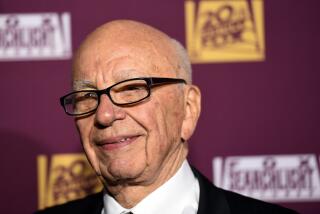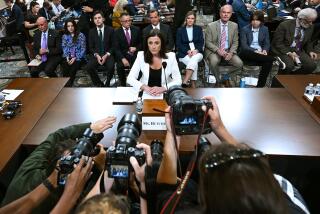Ex-White House Clerk Differs With Poindexter
- Share via
WASHINGTON — A former White House aide, contradicting a key point in the testimony of former National Security Adviser John M. Poindexter, has told investigators that he saw two secret memoranda proposing the diversion of profits from Iranian arms sales to the Nicaraguan rebels, congressional sources said Sunday.
The witness, James Radzimski, was the clerk in charge of maintaining the National Security Council’s most secret documents, known as “System Four” documents, until the fall of 1986. In closed-door testimony, the sources said, he has told the House and Senate committees investigating the Iran- contra scandal that he saw two separate memos describing the scheme to use profits from President Reagan’s secret arms sales to Iran to resupply the contras.
A Critical Point
The point is critical because Poindexter and former NSC aide Oliver L. North have differed in their sworn testimony before the panels over how many “diversion memos” North sent to Poindexter. North testified two weeks ago that he wrote five memos describing the diversion scheme and gave them all to Poindexter; Poindexter testified last week that he saw only one such memo.
“In a way, this guy breaks the tie when he says that he saw more than one,” said one source familiar with Radzimski’s account. “This does give Poindexter some problems.”
Poindexter is also the only authoritative witness who has told the committees that Reagan did not know of the diversion scheme; North testified that he had “assumed” that the President did know.
Faced with the contradiction between the Poindexter and North testimony, some members of Congress--and a large percentage of the public, as measured in recent polls--have concluded that Poindexter may not be telling the truth. Radzimski’s testimony, which was first disclosed by the Associated Press, may shake Poindexter’s credibility even further, the congressional sources said.
Of five members of the congressional committees who commented on the matter Sunday in appearances on all three of the major network interview shows, only one, Rep. Louis Stokes (D-Ohio), expressed flat disbelief in Poindexter’s testimony. House Majority Leader Thomas S. Foley (D-Wash.) said he had “no reason not to believe” Poindexter, but called it “very disturbing” because the fact that a national security adviser made a “key foreign policy decision for the President without telling him” set a “terribly dangerous precedent.”
Poindexter to Return
Poindexter is scheduled to resume his testimony before the committees this morning at 6 a.m. PDT and finish testifying on Tuesday. The panels tentatively plan to call Radzimski as a witness on Tuesday afternoon, one source said.
Radzimski’s recall of the memos he saw is not detailed, the sources said. “It’s not clear how much of the memos he read,” one said.
But he has testified that he did notice two separate memos referring to the diversion of “residual funds” from the arms sales, one early in 1986 and another that spring. North testified that he wrote five “diversion memos” beginning in January or February of 1986, and that at least three of them were put in final form. He said he sent the memos to Poindexter to pass on to Reagan.
After the Iranian arms sales were disclosed publicly last November, North testified that he attempted to destroy every document referring to the diversion. But he missed one, and it was discovered by Justice Department officials.
Recalls One Memo
Poindexter has testified that he saw only one such memo--the one the Justice Department discovered. “I do not recall any (other) memo that addressed the question of diversion,” he said.
If Radzimski did see more than one memo, it would suggest that North had indeed sent more than one to Poindexter. Normally, memos that were turned over to the “System Four” archive, which Radzimski managed, were those that had been completed and sent to their addressees, a former NSC official said.
“Radzimski says he saw two memos, so in a way he’s disagreeing with both Poindexter and North,” a congressional source said. “But there’s a way to square his version with North’s--maybe there were other memos, but he didn’t see them or didn’t notice them. There isn’t any obvious way to square his testimony with Poindexter’s.”
With Democrats dissenting, Republican members of the congressional investigating committees argued on Sunday’s interview shows that the time has come to wind down the investigation.
An ‘Overblown Issue’
“I think we ought to get over this overblown issue and get back to doing the things that really are important for our country,” said Sen. Orrin G. Hatch (R-Utah) on NBC’s “Meet the Press.”
In a similar vein, Rep. Henry J. Hyde (R-Ill.) declared that the hearings had produced “no smoking gun, not even a holster” linking the President to the diversion of profits from the secret sale of arms to Iran to support for the Nicaraguan rebels.
“I think the President has won a victory,” Hyde said on ABC’s “This Week with David Brinkley.” He predicted the affair “will soon be crowded out” by such major public issues as the still-tentative plan for a fall summit meeting between Reagan and Soviet leader Mikhail S. Gorbachev, arms control and trade legislation.
And Rep. Dick Cheney (R-Wyo.) maintained on the CBS program “Face the Nation” that, even though polls indicate that a majority of the American people do not believe Reagan’s denials that he knew of the diversion, the affair will not be a significant long-term issue with the public.
‘Managing the Economy’
“I think they’re going to judge him, in this final 18 months in office, on how he does managing the economy, the future of efforts to deal with the Russians on arms control and the future of the Bork nomination (the President’s nomination of Judge Robert H. Bork to the Supreme Court, which many Democrats oppose).”
Democrats took exception. Sen. George J. Mitchell (D-Me.) agreed with Cheney that Reagan “will no doubt continue to function, and merely by virtue of the fact that he’s President with veto power.” But Mitchell said he did not think the President “will ever again reach the status he was in prior to last November,” when Republicans lost the control of the Senate they enjoyed for the first six Reagan years.
Foley, appearing on ABC, said he was glad Reagan was not “guilty of knowledge” because this will give him “an opportunity to function in the last 18 months of his Administration.” But the “apparent corroboration” by Poindexter of Reagan’s denial that he knew of the diversion will not by itself “make this President an effective President,” Foley said.
Stokes said he found it difficult to believe “that somewhere along the line” North “did not take the opportunity to say something to the President” about the diversion of the arms profits to the Nicaraguan rebels.
In a brief appearance on “Face the Nation,” British Prime Minister Margaret Thatcher avoided direct comment on the controversy, but said she had called on Reagan Friday as “a staunch ally and loyal friend at all times.” She went on to criticize the American news media for taking “too downbeat a view” of the U.S. place in the world in the wake of the Iran-contra affair.
“Cheer up, cheer up,” she said. “Be more upbeat.
“Why are you doing your level best to put your worst foot forward? Why? America is a great country,” the prime minister said.
A published suggestion by Patrick J. Buchanan, former director of communications in the Reagan White House, that Reagan pardon North and Poindexter--if their indictment should be proposed by independent counsel Lawrence E. Walsh--generated debate and divisions on the Sunday panel shows.
Stokes said such a move, proposed by Buchanan in an article for Sunday’s Washington Post, would represent “a very serious mistake” on Reagan’s part. Cheney called the idea of criminal prosecution of the two former White House aides “absurd” and Hatch said he hoped “it never comes to that,” predicting that it will be “very difficult to find a theory of criminal liability to build against them.”
Mitchell refused to take a position on the question, calling it “wrong for American politics to attempt to influence judicial proceedings.”
No panelist supported a suggestion by Buchanan that Reagan “demand, not request” $500 million to aid the Nicaraguan rebels, instead of the $100-plus million he is expected to ask, and, if Congress fails to act, “find the supplies, ship them openly and challenge the Congress to impeach him.”
More to Read
Sign up for Essential California
The most important California stories and recommendations in your inbox every morning.
You may occasionally receive promotional content from the Los Angeles Times.














